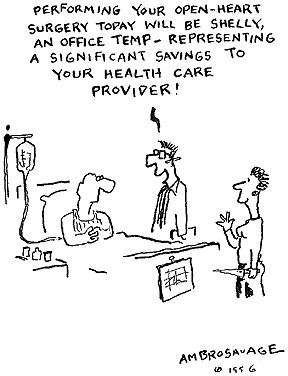Healthy Options -
Neither Healthy Nor An Option
The Washington state managed care program, called "Healthy Options," was implemented in 1993 for 400,000 children and families receiving federally mandated Medicaid benefits through the Aid for Families and Dependent Children (AFDC) program. Unlike other states, enrollment in managed care has been mandatory in Washington, which has had dire consequences for Medicaid recipients with urgent medical needs or chronic conditions requiring intensive treatment. There is an obvious incentive to limit or deny medical services when the state contracts with private insurers on a capitated or pre-paid basis. Yet after three years the Department of Social and Health Services (DSHS) still has no mechanism in place to guarantee that the private insurance companies to whom they pay 1.2 billion dollars a year actually deliver the medical services the companies contract to deliver.
 |
|
|
Declines in Pre-Natal and Preventive Care
It is no surprise that the limited medical performance reviews completed thus far, by the Oregon Medical Professional Review Organization and the Seattle-King County Health Department, have documented a clear decline in all medical services when patients are transferred to managed care. As reported in the September 4, 1995 issue of Modern Health Care, Oregon's move to managed care has resulted in less prenatal care and consequent lower birth weights.
Health Care Becomes a Commodity
In 1994 Forbes magazine designated "managed health care" as the number one growth industry (beating out oil and banking with an average return of 17 percent on equity). This raises grave concerns about the human suffering and preventable deaths stemming from service denials in managed care. According to Vincente Navarro in Capitalism in Health Care (1996), studies indicate that 100,000 Americans die annually because they can't afford health care coverage. At the same time the portion of the health care dollar diverted from actual medical care to administrative expense and profit ranges from 17 percent for a non-profit HMO like Group Health, to 27.1 percent for giant for-profit conglomerates like the recently merged Aetna/US Healthcare Corps. An alarming proportion of premiums goes for the extravagant compensation paid insurance CEOs:
| Annual Compensation for Insurance CEO's (1994) | |
| Leonard Abramson (US Healthcare Corp) | $20 million |
| William McGuire (US Behavioral Health) | $6 million |
|
Betty Woods (Blue Cross of Washington and Alaska her husband preceded her as CEO) |
$742,000 |
| Dale Francis (King County Blue Shield) | $627,000 |
| (source: New York Times 4/25/95, Seattle PI 3/6/96) | |
There is increasing consensus among patients, health care providers and the major corporations who pay their employees' insurance premiums that insurance CEOs are the only real beneficiaries of the massive drive to "privatize" Medicare and Medicaid. The only real solution to the current health care crisis is to eliminate the insurance middlemen, not to line their pockets. In 1991 the General Accounting Office estimated that eliminating private health insurance companies and replacing them with a single, publicly funded trust like Social Security would save over $100 billion a year - enough money to provide comprehensive coverage for the 44 million Americans presently uninsured.
Stuart Bramhall is a member of the Washington Single Payer Action Network (Wa- SPAN), which is currently working with single payer activists from California, Oregon, Alaska and Colorado to explore the possibility of a regional (five state) single payer initiative in 1998 or 2000. For information call or write:
Seattle's Downtown Boom
Nordstrom Deal Update
Corporate Welfare Resources on the 'Net
 |
 |
 |
 |
 |
Contents on this page were published in the January/February, 1997 edition of the Washington Free Press.
WFP, 1463 E. Republican #178, Seattle, WA -USA, 98112. -- WAfreepress@gmail.com
Copyright © 1997 WFP Collective, Inc.